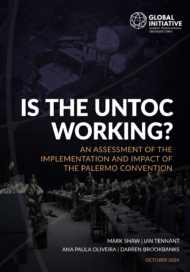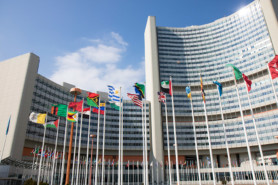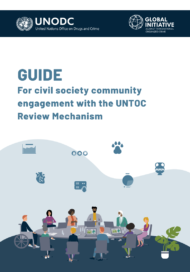Posted on 16 Sep 2025
The United Nations Convention Against Transnational Organized Crime (UNTOC), adopted in 2000, turns 25 this year. To mark this milestone, the Transnational Criminal Law Review published a special issue in August featuring reflections from a range of experts on the impact of the convention and its three supplementary protocols. But far from celebrating its achievements, most experts raised a consistent set of challenges that are hampering the instrument’s success.
Francesco Calderoni, a criminology professor at the Catholic University of Milan, evaluates the role of the UNTOC in developing national legislation to implement organized crime offences. Despite the treaty’s widespread ratification, he concludes that its ability to standardize and improve local legal action against organized crime remains limited. He cites Germany as an example, noting that the country only reformed its criminal association offence in 2017 due to pressure from the EU rather than owing to the UNTOC. Meanwhile, countries such as Denmark and Sweden have continued to resist introducing a standalone offence for participating in a criminal group despite having ratified the convention. In Africa, although 52 out of 54 states have ratified the convention, only 20 have enacted legislation aligned with its definitions, leaving a patchwork of approaches to organized crime.
Conversely, Calogero Ferrara, a European delegated prosecutor at the European Public Prosecutor’s Office, views the instrument favourably as a bastion of international cooperation and an important tool in resisting organized crime. While discussing its achievements, he considers how the UNTOC can adapt to evolving crime and enhance its impact.
More critically, Neil Boister, a law professor at the University of Canterbury, argues that problems with implementation undermine the idea that the UNTOC is central to international cooperation. He identifies the main issues as the lack of data on compliance and the shortcomings of the UNTOC review mechanism. He concludes that the entire system needs to change to enhance cooperation through the instrument.
Regarding the supplementary protocols to the convention, Frank Zimmermann, a professor at the University of Freiburg, assesses the Protocol against the Smuggling of Migrants and examines the duty of states to criminalize particular acts, exploring where these duties begin and end. Luigi Achili, a research fellow at the European University Institute, examines the protocol’s implementation through a case study of its application by EU member states. He illustrates how states have enabled migrant smuggling and calls for greater emphasis to be placed on protection, internal objectives and enforcement.
With regard to the Firearms Protocol, Max Menn, listed as a crime prevention and criminal justice officer at the UN Office on Drugs and Crime, looks at the protocol’s role in the developing international arms control framework, and considers the opportunities for the protocol and other existing global arms control instruments to be implemented together within a multilevel framework. On the Trafficking in Persons Protocol, Marika McAdam, an international law and policy adviser, highlights how counter-trafficking issues have become separated from the broader transnational organized crime agenda, resulting in ineffective state responses to human trafficking.
On the issue of cybercrime, Karinne Bannelier, an associate professor of international law at the University of Grenoble Alpes, provides a preliminary evaluation of the UN Cybercrime Convention and its potential impact on the UNTOC. The Cybercrime Convention’s adoption in December 2024 followed a complex negotiation period that saw a divide between authoritarian states and Western democracies, which initially opposed the document. Bannelier asserts that the instrument faces criticism from sceptics, who are concerned about its overly broad scope, expansive surveillance powers and insufficient human rights safeguards.
In their contribution to the special issue, Mark Shaw and others from the Global Initiative Against Transnational Organized Crime conclude that the UNTOC’s effectiveness remains questionable and that a realistic assessment of the convention’s impact and implementation is essential. Strengthening the UNTOC, they argue, will require more robust data collection, greater transparency and deeper engagement with civil society. Amid fragmented geopolitics and competing priorities, greater political commitment is needed to fulfil the convention’s potential, which has thus far remained untapped.
In late September, delegates will begin informal negotiations on the outcome document for the Crime Congress, which will take place in 2026. Now is the time for delegates to take stock of the growth and proliferation of transnational organized crime and truly ask themselves, ‘Is the UNTOC working?’.



